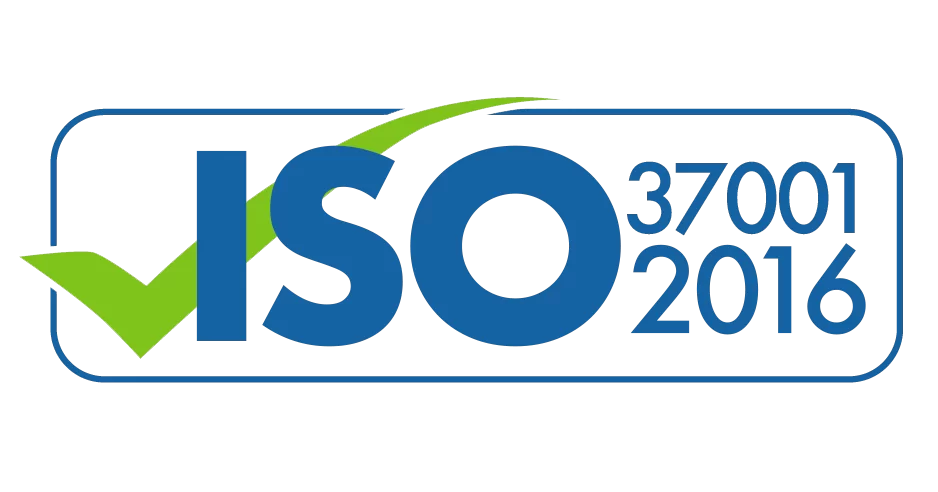Management System - Anti Bribery Management System ISO 37001

Principles of ISO 37001 Management System:
1. Prevention: ISO 37001 emphasizes the importance of preventing bribery from occurring in the first place through proactive measures, controls, and awareness programs.
2. Detection: While prevention is paramount, ISO 37001 also addresses the need for detecting bribery when it occurs. This includes establishing mechanisms for reporting suspected bribery and conducting investigations.
3. Response: Organizations must respond promptly and effectively to incidents of bribery, including taking corrective actions, implementing disciplinary measures, and cooperating with authorities if necessary.
4. Continuous Improvement: ISO 37001 promotes a culture of continuous improvement, where organizations regularly review and enhance their anti-bribery measures based on changing circumstances and lessons learned.
Benefits of Implementing ISO 37001 Management System:
1. Reduced Risk of Bribery: By implementing ISO 37001, organizations can identify and mitigate bribery risks, reducing the likelihood of bribery occurring within their operations.
2. Enhanced Reputation and Credibility: Certification to ISO 37001 demonstrates an organization's commitment to integrity, transparency, and ethical behavior, enhancing its reputation and credibility with stakeholders, customers, and business partners.
3. Legal Compliance: ISO 37001 helps organizations comply with anti-bribery laws and regulations, reducing the risk of legal liabilities, fines, and penalties associated with bribery offenses.
4. Improved Business Relationships: Organizations that implement ISO 37001 may gain a competitive advantage by demonstrating their commitment to ethical business practices, fostering trust and confidence among customers, suppliers, and investors.
5. Cost Savings: Preventing bribery can lead to cost savings by avoiding financial losses, reputational damage, and legal expenses associated with bribery investigations and prosecutions.
ISO 37001 is an international standard that provides guidance for
establishing, implementing, maintaining, reviewing, and improving an
anti-bribery management system (ABMS). Here's an overview of the key components
and principles of an ISO 37001 management system:
Key Components of ISO 37001
Management System:
1. Leadership and Commitment: Top management demonstrates leadership
and commitment to preventing bribery by establishing an anti-bribery policy,
allocating resources, and promoting a culture of integrity and ethical behavior
throughout the organization.
2. Risk Assessment: Organizations identify and assess bribery risks
associated with their operations, activities, and business relationships. This
includes evaluating internal and external factors that may increase the
likelihood of bribery and its potential impact on the organization.
3. Anti-Bribery Controls: Organizations implement controls to
mitigate bribery risks and prevent bribery from occurring. This includes
establishing policies, procedures, and mechanisms for due diligence, gifts and
hospitality, conflicts of interest, and reporting of suspected bribery.
4. Training and Awareness: Organizations provide training and
awareness programs to ensure that personnel understand their roles and
responsibilities in preventing bribery, recognize bribery risks, and know how
to report suspected bribery.
5. Communication and Reporting: Organizations establish channels
for communication and reporting of suspected bribery, including whistleblowing
mechanisms, confidential reporting procedures, and protection for
whistleblowers.
6. Monitoring and Review: Organizations monitor the effectiveness
of their anti-bribery measures through regular reviews, audits, and
evaluations. This includes assessing the implementation of controls, monitoring
compliance with policies and procedures, and addressing any non-conformities or
weaknesses identified.
7. Continuous Improvement: Organizations continually improve their ABMS by responding to changes in bribery risks, legal and regulatory requirements, and stakeholder expectations. This includes reviewing and updating policies and procedures, enhancing training programs, and implementing lessons learned from incidents and audits.
Overall, ISO 37001 provides a systematic approach to preventing bribery and promoting integrity within organizations. It helps organizations establish a culture of ethical behavior, transparency, and accountability, which are essential for sustainable business success.

